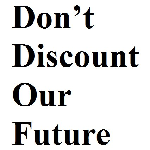 Jan Kunnas Jul 18, 2014 02:29 |
Hi Timothy,
I like your proposal although I do not agree with all points. y main worry is that you might not actually answer to the contest question: "How can we enable young people to take leadership now, and make a difference against climate change?" You should probably add more discussion on what the youths themselves should to promote the goals of this proposal.
I agree with you that the chosen discount rate can has big implications for climate policy. A lower discount rate would give a higher value for the estimated damage an unit of carbon dioxide would case, as the common way to put a price on carbon is to discount future damages back to present.
I am convinced that the discount rate should be small enough, so we do not discount future away. I am, however, not convinced that we should have a zero discount rate. I do think that the price of carbon should vary in time as "One unit of a stock pollutant added to an already large stock is likely to cause a higher damage than a unit emitted under a low concentration level. In other words, ‘a ton of CO2 added to an already large stock of atmospheric CO2 is likely to cause a higher damage than a ton emitted under a low concentration level". For further details see: Jan Kunnas, Eoin McLaughlin, Nick Hanley, David Greasley, Les Oxley & Paul Warde, "Counting Carbon: Historic emissions from fossil fuels, long-run measures of sustainable development and carbon debt,” Scandinavian Economic History Review. http://www.tandfonline.com/doi/full/10.1080/03585522.2014.896284#.U77v_pSSwrW
A negative discount rate would lead to paradoxical outcomes while discounting future damages to present, the present value of future damage would be higher than the realized damages in the future.
Of course if we trigger runaway carbon dynamics making the planet uninhabitable not discount rate matter any more. Perhaps we should use a minimax strategy instead, see http://www.escholarship.org/uc/item/38m9n5kn
|
 Timothy Damon Jul 18, 2014 04:01 | Proposal contributor
Hi Jan,
Thank you for the valuable feedback and useful links. I agree with the premiss of your second article (link) that the benefits of development in developed countries have not adequately trickled down to developing countries, whose poor citizens will also bear the brunt of future climate costs (and to an extent already are).
In regard to my proposal:
1) Indeed, I could do more to explain how this proposal fits the category's goal of empowering youth. This addition will happen soon. Many young people I have presented this topic to have agree we should lower the discount rate, and it is the case that young people have a unique moral authority to argue for such a change because it is our future at stake.
2)I am open to discussion of a positive discount rate that is less than or equal the Stern Review's SDR of 1.4%. While this is not ideally reflective of Intergenerational Justice in my view, it would still be a significant improvement from the status quo. Setting the SDR at 0% would treat each generation equally, with people today acting as though they will be the ones affected later by the consequences of today's policies. Incidentally, today's youth will, in fact, still be alive at that time. Therefore many of us can perceive the value of our future lives as being nearly equal to our lives today (our personal SDR is in effect ~0%).
3) You are correct to say that a negative discount rate would have us placing a higher value on future damage than its realized cost in the future. Is this really paradoxical? Since the symbolic meaning of a negative SDR would be that people today want to leave behind a world of even greater value than what they enjoyed today, I think it follows that the difference in the discounted (NPV) and actual (realized) costs would represent the disutility they would suffer from knowing their present actions inflicted the future harm. In other words, they would suffer a harm in the present from knowing their actions would cause a harm upon their children in the future. I'm not saying this is a feasible SDR to use in policy, but rather theorizing about what percentages of SDR would represent certain values some people hold.
|
 Timothy Damon Jul 19, 2014 01:50 | Proposal contributor
Hi Jan again,
In response to your feedback, I have added a further explanation of how my proposal regarding the social discount rate will help to empower youth leadership in regard to climate change.
Please let me know if this resolves your main concern about relevancy.
Best,
Tim
|
 Mel Smith Jul 29, 2014 03:54 |
Wow, I never studied economics before to know about this! Sounds like we need to make a change! More of us need to learn about this issue so we can have a good future for our generation.
|
 Linh Do Jul 31, 2014 10:22 |
Cool proposal Tim!
|
 Gerald Barney Aug 1, 2014 10:13 |
Hi Tim,
In my opinion, discount rates are key to addressing climate change and all issues of inter-generational justice.
Jerry Barney
|
 Martha Nowlan Aug 1, 2014 11:36 |
One of the strongest arguments for systemic change lies within the economic aspects of environmental issues. Kudos to Tim for arguing for changes in the way that economists value future generations. If we put more value on future generations, we'll understand the true impact that our current actions are having on humanity's future.
The unavoidable problem: we shouldn't even be able to place a monetary value on a human life-- past, present, or future. Same goes for nature, species, etc. But that's a compromise that arguably must be made in order to effectively communicate value to economists.
|
 Timothy Damon Aug 5, 2014 02:14 | Proposal contributor
Thank you for the positive comments, everyone.
@Martha: For as long as our system uses cost-benefit analysis in decision-making, it will be necessary to ensure that people, the environment ("ecosystem services"), etc are treated with their proper value. That does not at all mean we cannot work toward having a different system, but such a change will not happen very soon I think - it will take a while for people's perceptions/values/priorities to change.
In the meantime, we can address problems with the way these values are assigned and used (such as discount rates), which I think helps to move us in the right direction.
|
 Suri Smith Aug 6, 2014 01:49 |
Hi Tim,
I really like your proposal. I hadn't thought about discounting before, but I can see how much it matters and why it totally needs to change. What seems less clear in your proposal is how to actually implement this change in economics. Maybe by going out and educating as many other young people as possible to get them politically motivated on this issue? I'd love to hear your thoughts.
Warm regards,
Suri M. Smith
|
 Timothy Damon Aug 7, 2014 01:15 | Proposal contributor
Hi Suri,
Thank you very much for your comment. You are right to point out that my proposal could elaborate much more on how to actually go about implementing the suggested change to the discount rate. If I get the chance to revise my proposal, I'll definitely give that question a thorough answer, but I am happy to give you a basic outline here.
We need to educate the public, especially young people, about the current practices in regard to discounting climate change, because the economists themselves are already aware of this issue; in fact, they have had internal debates previously about the ethical dilemmas involved with discounting the future - not all agree doing so is just. But the general public has never been included in, or even known of, such debates.
We need to change that. I have given multiple presentations about discounting to other young people, and each time they have become fired up to change it once they realized its role in discouraging sustainable behaviors and policies. Older people too, who have children and grandchildren whose futures they care very much about, have shared these sentiments; they want our economic models to reflect the value they place on their offspring's future, not for them to be contradictory.
This is how we can bring about a lowering of the social discount rate, either to the percentage that Lord Stern already used, or perhaps even closer to zero. Educating enough people will generate enough political will for governments to respond by mandating an appropriate shift in discounting policy. If we can just bring discounting out from behind the technocratic curtains of economics and into a clear and candid public debate, I am confident people will support a change to make our economic practices match their moral values regarding youth and future generations.
That's how we begin to get there, and I'm personally quite ready to take on that educational challenge and the ensuing debate of policy and ethics. I'm always willing to speak on this topic, and would certainly consider taking an educational program on tour in the event my proposal won some funding to make such a program feasible for me.
Best wishes,
Tim
|
 Secretary Uphar Aug 11, 2014 03:55 |
this proposal(!) looks like an article on youth and climate change! Youth action is not present in the proposal..
|
 Timothy Damon Aug 11, 2014 05:47 | Proposal contributor
Dear Secretary Uphar,
Thank you for your comment and for taking the time to view my proposal.
Please let me first draw your attention to my previous comment above, in which I discuss the desire to add content to my proposal regarding programs to educate youth about the economics of climate change. These would, I believe, constitute "youth action" (youth educating other youth).
Secondly, my proposal is also suggesting (though it may not be clear from the current version) that youth take action to raise political will in support of its implementation using their unique "moral voice" when discussing climate change and how we value their future.
Finally, please consider that this contest is seeking ways to empower young people, and that such empowerment does not necessarily require youth taking action themselves, but rather becoming better able to to so - my proposal includes a section explaining how it would empower youth action, and you are welcome to comment on what you think of that reasoning.
For reference, the contest prompt states, in part: "The Elders and CliMates seek innovative ways to empower youth in climate change decision-making and high-impact climate action. This could include changes in education systems, economic models...". My proposal, as currently written, discusses how to change "economic models" in a way that would "empower youth in climate change decision-making". Lowering the discount rate would also be very "high-impact".
Thank you again for taking the time to view my proposal. I'm happy to discuss any of the above with you further.
Best,
Tim
|
 Climate Colab Aug 13, 2014 03:19 |
Dear timdamon,
Thank you very much for your proposal on the “Youth action on climate change” contest.
Your proposal has progressed to the semi-finals, congratulations!
The originality of it and its potential as a “game-changer” in terms of economic decision-making were particularly appreciated by the Judges. However, they also noted that the efforts necessary to actually promote it towards political and economic leaders were vastly underestimated, and the role of youth in that promotion seemed very limited. A revised proposal would need to show a clear action plan for a youth-led promotion of the idea, including how the $10,000 grand prize would be put to use. Finally, the Judges felt that the proposal was unnecessarily complicated in its phrasing - part of the effort to make it more inclusive to youth would be to rid it of its jargon and make it understandable and appealing to young people.
Thanks again for your contribution, and best of luck revising your proposal for the Finals!
Best,
Antoine on behalf of the “Youth action” fellows
|
 Climate Colab Sep 3, 2014 12:28 |
The Judges have advanced this proposal to the Finalists round. Good luck during the voting period!
|
 Osero Shadrack Tengeya Sep 17, 2014 05:35 |
Hi Tim and friends, kindly consider to vote for my proposal shown in the link below
https://www.climatecolab.org/web/guest/plans/-/plans/contestId/1300206/planId/1002
Thanks in advance.
|
 Anne-marie Soulsby Sep 23, 2014 03:36 |
Hi timdamon,
Please consider voting for my proposal, https://www.climatecolab.org/web/guest/plans/-/plans/contestId/1300801/planId/1309001
Good luck with your entry!
Asante/Thank-you
@conserveaction
|
 Kathie Lavery Sep 29, 2014 04:23 |
Hi Timothy,
I just want to let you know that I think this proposal merits serious consideration by all generations. It can be applied globally, and involves empowerment through education of youth, who can then educate anyone of any age. Many of my friends would like to vote for it, but they're all older (parents and grandparents concerned about the future) and most don't have computers, or are wary of doing anything online which requires giving their real names or email addresses. I'm sorry this is costing you votes, and wish you well for your selection.
Thanks, Kathie!
|
 Victor Blanco Oct 4, 2014 11:34 |
Congratulations!!!
Please check the "Discusion Section" in the "Community" label... Proposal of activity during the Conference Session of 2014 Winners...
https://www.climatecolab.org/web/guest/discussion#discussion%3DpageType%3ATHREAD%2CthreadId%3A1337218
|
